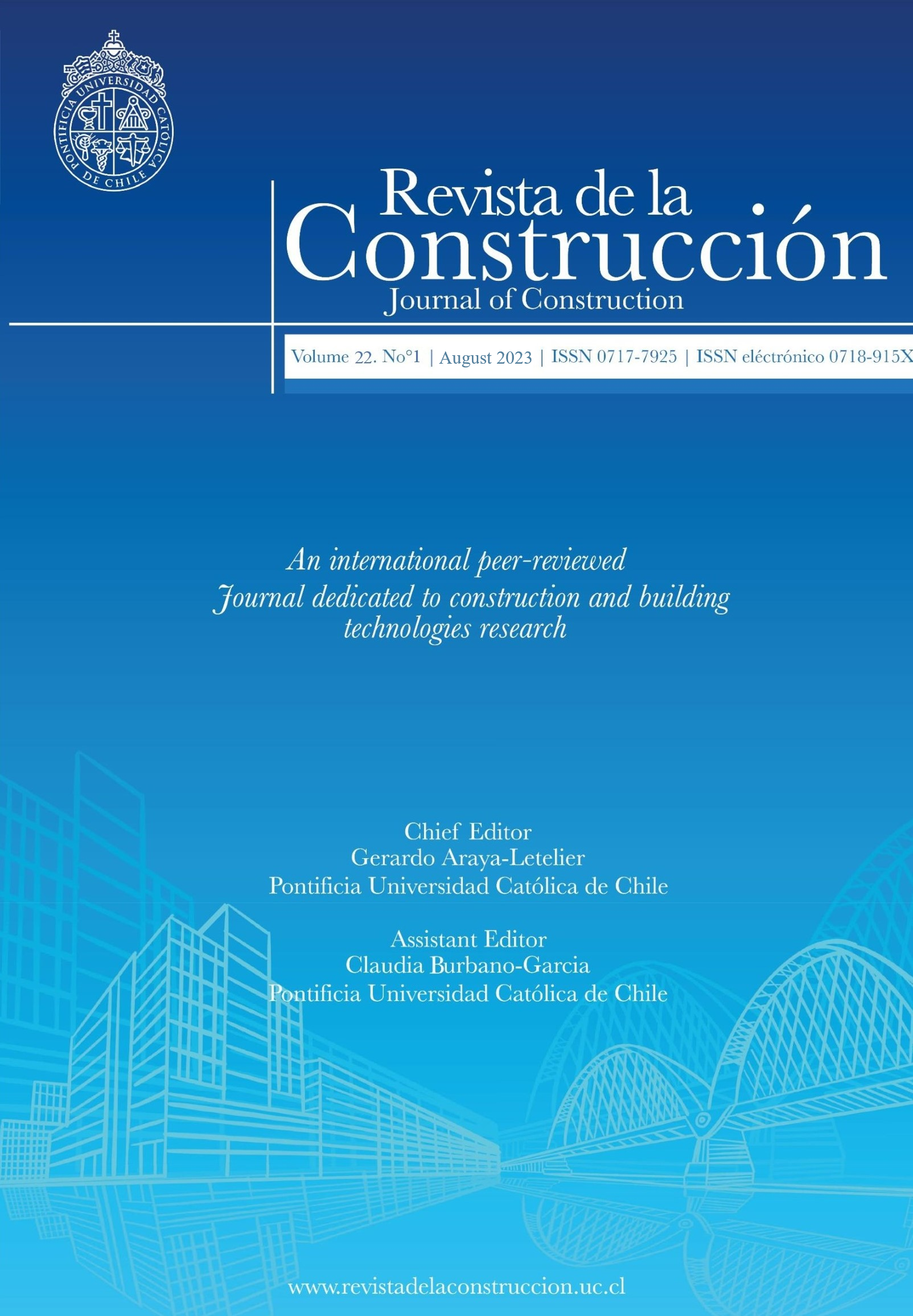A new perspective in construction management; the metaverse
DOI:
https://doi.org/10.7764/RDLC.22.2.321Keywords:
Artificial intelligence, neural networks, fuzzy logic, CPM, PERT.Abstract
A conceptual construction management model can be applied to the metaverse 3D technology in this study, which demonstrates how accelerated back-and-forth replays of the construction process can be used to evaluate the impact of new decisions on the project. Participants in the proposed model will be able to see exactly how their decisions during construction affect the progress of the project. In order to develop this model, three phases are required: 1) Analyzing the problem and planning the algorithm, 2) collecting data and designing the hybrid model utilizing artificial intelligence and construction network scheduling techniques, and 3) coding the algorithm. The design-based research will contribute to the development of new meta-models for construction management, present innovative ideas for students, engineers, and managers working in the field of construction management.
Downloads
References
Ahuja, A. S., Polascik, B. W., Doddapaneni, D., Byrnes, E. S., & Sridhar, J. (2023). The digital metaverse: Applications in artificial intelligence, medical education, and integrative health. Integrative Medicine Research, 12(1), 100917. https://doi.org/10.1016/j.imr.2022.100917
Al-Adwan, A. S., Li, N., Al-Adwan, A., Abbasi, G. A., Albelbisi, N. A., & Habibi, A. (2023). “Extending the technology acceptance model (TAM) to predict university students’ ıntentions to use metaverse-based learning platforms”. Education and Information Technologies. https://doi.org/10.1007/s10639-023-11816-3
ALSaadi, N., & Norhayatizakuan, N. (2021). The ımpact of risk management practices on the performance of construction projects. Studies of Applied Economics, 39(4). https://doi.org/10.25115/eea.v39i4.4164
Alvarez, J., Del Angel, D., & Martínez, M. (2023). Tec Virtual Campus, a metaverse for engineering learning. 2023 IEEE World Engineering Education Conference (EDUNINE). IEEE. Retrieved from http://dx.doi.org/10.1109/edunine57531.2023.10102856
Asiksoy, G. (2023). Empirical studies on the metaverse-based education: A systematic review. International Journal of Engineering Pedagogy (iJEP), 13(3), 120–133. https://doi.org/10.3991/ijep.v13i3.36227
Banihashemi, S., Khalilzadeh, M., Antucheviciene, J., & Šaparauskas, J. (2021). Trading off time–cost–quality in construction project scheduling prob-lems with fuzzy SWARA–TOPSIS approach. Buildings, 11(9), 387. https://doi.org/10.3390/buildings11090387
Benedikt, M. L. (1970). Cityspace, cyberspace, and the spatiology of information. Journal For Virtual Worlds Research, 1(1). https://doi.org/10.4101/jvwr.v1i1.290
Bhowmik, P., Udgata, G., & Trivedi, S. (2022). Risk assessment in construction industry using a fuzzy logic. In Recent Developments in Sustainable Infra-structure (ICRDSI-2020)— Structure and Construction Management (pp. 517–526). Springer Link. Retrieved from https://link.springer.com/chapter/10.1007/978-981-16-8433-3_44
Cebeci, C. (2013). Analysis and evaluation of different approaches to determine quality costs. Journal of Management and Economics Research, (21), 281–281. https://doi.org/10.11611/jmer175
Chaher, Z., & Soomro, A. R. (2016). Fuzzy risk analysis for construction projects. World Applied Sciences Journal, 34(8), 1010–1020. https://doi.org/DOI: 10.5829/idosi.wasj.2016.34.8.70
Chen, Z. (2023). Metaverse office: Exploring future teleworking model. Kybernetes. https://doi.org/10.1108/k-10-2022-1432
Chow, Y.-W., Susilo, W., Li, Y., Li, N., & Nguyen, C. (2022). Visualization and cybersecurity in the metaverse: A survey. Journal of Imaging, 9(1), 11. https://doi.org/10.3390/jimaging9010011
De Felice, F., Petrillo, A., Iovine, G., Salzano, C., & Baffo, I. (2023). How does the metaverse shape education? A systematic literature review. Applied Sciences, 13(9), 5682. https://doi.org/10.3390/app13095682
Dikmen, I., Birgonul, M. T., & Han, S. (2007). Using fuzzy risk assessment to rate cost overrun risk in international construction projects. International Journal of Project Management, 25(5), 494–505. https://doi.org/10.1016/j.ijproman.2006.12.002
Dizaji, A., & Dizaji, A. (2023). Metaverse and Its Legal Challenges. Synesis, 15(1).
ElBassuony, M. (2010). Time-cost-quality trade-off analysis for construction projects. The American University in Cairo. AUC Knowledge Fountain.
Farida, Y., & Putri Anenda, L. (2022). Network planning analysis on road construction projects by CV. X using evaluation review technique (pert)-critical path method (CPM) and crashing method. International Journal of Integrated Engineering, 14(4). https://doi.org/10.30880/ijie.2022.14.04.029
Gray, C. F., & Larson, E. W. (2020). Project management: The managerial process. McGraw-Hill Education.
Gu, J., Wang, J., Guo, X., Liu, G., Qin, S., & Bi, Z. (2023). A metaverse-based teaching building evacuation training system with deep reinforcement learn-ing. IEEE Transactions on Systems, Man, and Cybernetics: Systems, 53(4), 2209–2219. https://doi.org/10.1109/tsmc.2022.3231299
Hagan, M.T., Demuth, H.B., Beale, M.H., & De Jesús, O. (n.d.). Dynamic Networks. Neural Network Design 2nd Edtion (53). https://hagan.okstate.edu/nnd.html
Hosny, O., & Elbassuony, M. (2018). Stochastic time-cost-quality trade-off analysis: The PERT approach. Construction Research Congress 2018. Reston, VA: American Society of Civil Engineers. Retrieved from http://dx.doi.org/10.1061/9780784481271.034
Huynh-The, T., Gadekallu, T. R., Wang, W., Yenduri, G., Ranaweera, P., Pham, Q.-V., & Benevides da Costa, D. (2023). Blockchain for the metaverse: A Review. Future Generation Computer Systems, 143, 401–419.
Huynh-The, T., Pham, Q.-V., Pham, X.-Q., Nguyen, T. T., Han, Z., & Kim, D.-S. (2023). Artificial intelligence for the metaverse: A survey. Engineering Applications of Artificial Intelligence, 117, 105581. https://doi.org/10.1016/j.engappai.2022.105581
Jeon, H., Youn, H., Ko, S., & Kim, T. (2022). Blockchain and AI meet in the metaverse. In Blockchain Potential in AI. IntechOpen. Retrieved from http://dx.doi.org/10.5772/intechopen.99114
Jiang, Q., Kim, M., Ko, E., & Kim, K. H. (2023). The metaverse experience in luxury brands. Asia Pacific Journal of Marketing and Logistics. https://doi.org/10.1108/apjml-09-2022-0752
Jiang, Y., Kang, J., Niyato, D., Ge, X., Xiong, Z., Miao, C., & Shen, X. (2023). Reliable distributed computing for metaverse: A hierarchical game-theoretic approach. IEEE Transactions on Vehicular Technology, 72(1), 1084–1100. https://doi.org/10.1109/tvt.2022.3204839
Khairullah, N. H., Hilal, M. A., & Mohammed, A. (2022). Identification of the main causes of risks in engineering procurement construction projects. Journal of the Mechanical Behavior of Materials, 31(1), 282–289. https://doi.org/10.1515/jmbm-2022-0029
Koutitas, G., Smith, S., & Lawrence, G. (2020). Performance evaluation of AR/VR training technologies for EMS first responders. Virtual Reality, 25(1), 83–94. https://doi.org/10.1007/s10055-020-00436-8
Le, Q. T., Pedro, A., & Park, C. S. (2014). A social virtual reality based construction safety education system for experiential learning. Journal of Intelligent & Robotic Systems, 79(3–4), 487–506. https://doi.org/10.1007/s10846-014-0112-z
Ledbetter, J. (2001). Wireless secrets and lies. Retrieved from http://www.thestandard.com/article/0,1902,27206,00.html?nl=int.
Li, K., Cui, Y., Li, W., Lv, T., Yuan, X., Li, S., … Dressler, F. (2023). When ınternet of things meets metaverse: Convergence of physical and cyber worlds. IEEE Internet of Things Journal, 10(5), 4148–4173. https://doi.org/10.1109/jiot.2022.3232845
Liu, K., Chen, L., Li, L., Ren, H., & Wang, F.-Y. (2023). MetaMining: Mining in the metaverse. IEEE Transactions on Systems, Man, and Cybernetics: Systems, 53(6), 3858–3867. https://doi.org/10.1109/tsmc.2022.3233588
Liu, M. (2013). Program evaluation and review technique (PERT) in construction risk analysis. Applied Mechanics and Materials, 357–360, 2334–2337. https://doi.org/10.4028/www.scientific.net/amm.357-360.2334
Massetti, M., & Chiariello, G. A. (2023). The metaverse in medicine. European Heart Journal Supplements, 25(Supplement B). https://doi.org/https://doi.org/10.1093/eurheartjsupp/suad083
Monaco, S., & Sacchi, G. (2023). Travelling the metaverse: Potential benefits and main challenges for tourism sectors and research applications. Sustain-ability, 15(4), 3348. https://doi.org/10.3390/su15043348
Moro, C. (2023). Utilizing the metaverse in anatomy and physiology. Anatomical Sciences Education, 16(4), 574–581. https://doi.org/10.1002/ase.2244
Narin, N. G. (2021). A content analysis of the metaverse articles. Journal of Metaverse, 1(1), 17–24.
Nguyen, D.-T., Le-Hoai, L., Basenda Tarigan, P., & Tran, D.-H. (2022). Tradeoff time cost quality in repetitive construction project using fuzzy logic approach and symbiotic organism search algorithm. Alexandria Engineering Journal, 61(2), 1499–1518. https://doi.org/10.1016/j.aej.2021.06.058
Nieto-Morote, A., & Ruz-Vila, F. (2011). A fuzzy approach to construction project risk assessment. International Journal of Project Management, 29(2), 220–231. https://doi.org/10.1016/j.ijproman.2010.02.002
Nuñez, J., Krynski, L., & Otero, P. (2023). The metaverse in the world of health: The present future. Challenges and opportunities. Archivos Argentinos de Pediatria. https://doi.org/10.5546/aap.2022-02942.eng
Park, C.-S., & Kim, H.-J. (2013). A framework for construction safety management and visualization system. Automation in Construction, 33, 95–103. https://doi.org/10.1016/j.autcon.2012.09.012
Pollack-Johnson, B., & Liberatore, M. J. (2006). Incorporating quality considerations ınto project time/cost tradeoff analysis and decision making. IEEE Transactions on Engineering Management, 53(4), 534–542. https://doi.org/10.1109/tem.2006.883705
Ramu, S. P., Boopalan, P., Pham, Q.-V., Maddikunta, P. K. R., Huynh-The, T., Alazab, M., … Gadekallu, T. R. (2022). Federated learning enabled digital twins for smart cities: Concepts, recent advances, and future directions. Sustainable Cities and Society, 79, 103663. https://doi.org/10.1016/j.scs.2021.103663
Ramyani, S., & Sparkling, A. E. (2021). Incorporating virtual reality in construction management education. ASEE Annual Conference Virtual Meeting.
Sá, M. J., & Serpa, S. (2023). Metaverse as a learning environment: Some considerations. Sustainability, 15(3), 2186. https://doi.org/10.3390/su15032186
Said, G. R. E. (2023). Metaverse-Based learning opportunities and challenges: A phenomenological metaverse human–computer ınteraction study. Elec-tronics, 12(6), 1379. https://doi.org/10.3390/electronics12061379
Schöbel, S. M., & Leimeister, J. M. (2023). Metaverse platform ecosystems. Electronic Markets, 33(1). https://doi.org/10.1007/s12525-023-00623-w
Seo, S., Seok, B., & Lee, C. (2023). Digital forensic investigation framework for the metaverse. The Journal of Supercomputing, 79(9), 9467–9485. https://doi.org/10.1007/s11227-023-05045-1
Șerbanoiu, I., Verdeș, M., Şerbănoiu, A. A., Șerbanoiu, B. V., & Munteanu, M. (2017). Actual trends in construction project management in Romania. Advanced Engineering Forum, 21, 587–595. https://doi.org/10.4028/www.scientific.net/aef.21.587
Shakil, A. (2019). A review on using opportunities of augmented reality and virtual reality in construction project management. Organization, Technology and Management in Construction: An International Journal, 11(1), 1839–1852. https://doi.org/10.2478/otmcj-2018-0012
Shao, L., Tang, W., Zhang, Z., & Chen, X. (2023). Medical metaverse: Technologies, applications, challenges and future. Journal of Mechanics in Medi-cine and Biology, 23(02). https://doi.org/10.1142/s0219519423500288
Siew, R. Y. J. (2015). Integrating sustainability into construction project portfolio management. KSCE Journal of Civil Engineering, 20(1), 101–108. https://doi.org/10.1007/s12205-015-0520-z
Soni, A., Ramesh Kumar, C., & Shrivastava, A. (2022). Construction projects risk assessment based on PERT, CPM and project management with Fuzzy Logic technique. Advances and Applications in Mathematical Sciences, 21(9), 5385–5395.
Stevens, J. D. (1989). Techniques for construction network scheduling. New York: McGRAW-HILL Publishing Company.
Tah, J. H. M., & Carr, V. (2000). A proposal for construction project risk assessment using fuzzy logic. Construction Management and Economics, 18(4), 491–500. https://doi.org/10.1080/01446190050024905
Tlili, A., Huang, R., & Kinshuk. (2023). Metaverse for climbing the ladder toward ‘Industry 5.0’ and ‘Society 5.0’? The Service Industries Journal, 43(3–4), 260–287. https://doi.org/10.1080/02642069.2023.2178644
Wang, T., Abdallah, M., Clevenger, C., & Monghasemi, S. (2019). Time–cost–quality trade-off analysis for planning construction projects. Engineering, Construction and Architectural Management, 28(1), 82–100. https://doi.org/10.1108/ecam-12-2017-0271
Wu, T., & Hao, F. (2023). Edu-Metaverse: Concept, architecture, and applications. Interactive Learning Environments, 1–28. https://doi.org/10.1080/10494820.2023.2198567
Wu, W., Tesei, A., Ayer, S., London, J., Luo, Y., & Gunji, V. (2018). Closing the skills gap: Construction and engineering education using mixed reality – A case study. 2018 IEEE Frontiers in Education Conference (FIE). IEEE. Retrieved from http://dx.doi.org/10.1109/fie.2018.8658992
Xie, H., & Yang, Z. (2021). The risk management mode of construction project management in the multimedia environment of ınternet of things. Mobile Information Systems, 2021, 1–8. https://doi.org/10.1155/2021/1311474
Yousri, E., Sayed, A. E. B., Farag, M. A. M., & Abdelalim, A. M. (2023). Risk ıdentification of building construction projects in Egypt. Buildings, 13(4), 1084. https://doi.org/10.3390/buildings13041084
Zainurin, M. Z. L., Haji Masri, M., Besar, M. H. A., & Anshari, M. (2023). Towards an understanding of metaverse banking: A conceptual paper. Journal of Financial Reporting and Accounting, 21(1), 178–190. https://doi.org/10.1108/jfra-12-2021-0487
Zeng, J., An, M., Chan, A. H. C., & Lin, Y. (2004). A methodology for assessing risks in the construction process. Khosrowshahi, F (Ed.), 0th Annual ARCOM Conference, 2, 1165–1174.
Zhang, H., & Xing, F. (2010). Fuzzy-multi-objective particle swarm optimization for time–cost–quality tradeoff in construction. Automation in Construc-tion, 19(8), 1067–1075. https://doi.org/10.1016/j.autcon.2010.07.014
Zheng, G., & Yuan, L. (2023). A review of QoE research progress in metaverse. Displays, 77, 102389. https://doi.org/10.1016/j.displa.2023.102389
Downloads
Published
How to Cite
Issue
Section
License
Copyright (c) 2023 Burak Oz

This work is licensed under a Creative Commons Attribution-NonCommercial-NoDerivatives 4.0 International License.








